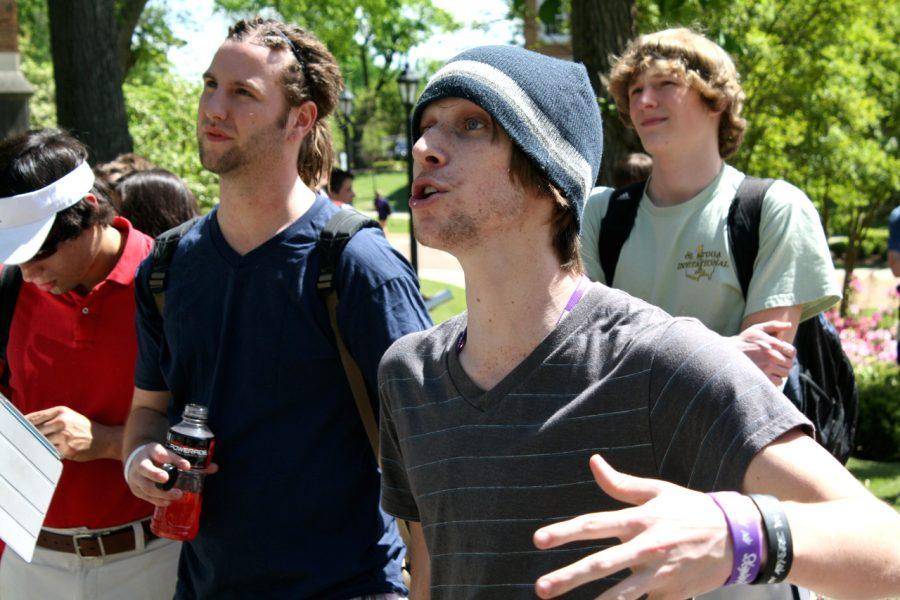Students sound off after radical preacher makes waves on campus
April 12, 2012
Hundreds of students gathered by the Memorial Amphitheater April 4 to hear Micah Armstrong, a radical Christian preacher who makes stops at various universities and colleges across the eastern and southern U.S.
Armstrong, who refers to himself as Brother Micah, spoke out against a number of topics, including homosexuality, sex outside of marriage, pornography, masturbation, drugs, smoking and more.
The event, which drew in a number of students who protested the preacher’s ideas and beliefs, caused controversy among the university community and raised the question of whether or not speakers like Armstrong should be allowed on campus.
Bret Jennings, director of University Events, said Armstrong has every right to speak on campus as long as his speech does not promote coercive disruption or violence.
“He says things that are offensive for people to hear but are not necessarily directed at a specific individual,” he said. “(Armstrong) cannot act in a violent manner toward a particular person and cannot threaten anyone specifically, and students cannot threaten him either. If violence is created, we as a university will have to step in and alleviate the situation.”
The university strives to be a diverse campus that is operated on the free exchange of ideas, inquiry and expression, according to the campus speech policy in the student handbook. Officials will tolerate all lawful, peaceful demonstrations of free expression as long as they do not cause coercive disruption at UNA.
Jennings said Armstrong’s words that were deemed offensive to many students did not constitute hate speech because he didn’t direct his comments at a particular individual and instead spoke more generally about society.
“If we feel that there is a legitimate hate type or violent situation, we have the opportunity and the right to stop that,” he said. “Students also need to be aware that if they threaten or harm him any way, they have the potential of being arrested.”
April is First Amendment Awareness Month, and Dr. Greg Pitts, chair of the Department of Communications, said Armstrong’s presence on campus is a reminder of the free speech rights U.S. citizens hold.
“(Armstrong) reminds us to be broader in our own thinking about the people and events we come in contact with,” he said. “We may not want to agree with and embrace what he has to say, but this could be a wonderful reminder for us to talk about freedom of speech and religion.”
Armstrong told UNA students last week he was saved 12 years ago and is not a sinner because he was born again and has been made right by the grace of God.
UNA student Arielle Jones spoke out against Armstrong during the rally.
“I think he’s a false prophet,” she said. “You’re supposed to preach with love. He’s not showing kindness or gentleness. As a Christian, I’m offended. It’s wrong what he’s doing. He’s making non-Christians harder to talk to by shutting them down. He’s giving (Christians) a bad name.”
Molly Linn, a UNA student, was discouraged by the event and said UNA students need to have more dignity with similar demonstrations in the future.
“Frankly, I’m a Christian and all he’s trying to do is a get a rise out of people,” she said. “When kids yell back at him, it’s just perpetuating the fighting. If they would just walk away, they would stop this.”
Jennings said Armstrong’s presence on campus last week took place in a free speech zone and was permitted because UNA is a state institution located on public property.
“I think it’s great to see the diversity of students and free speech out there,” Jennings said. “When students make the choice to stop and listen, they’re doing nothing but adding fuel to the fire.”
Pitts is hosting several events within his department in celebration of First Amendment Awareness Month, including a speech by Gene Policinski, director of the First Amendment Center, April 19 at 7 p.m. in room 131 of the communications building.
“Even if someone doesn’t have the chance to attend, I encourage them to pause and reflect for a minute about the important rights we do have,” Pitts said.













David Boswell • Jan 17, 2022 at 10:20 pm
Street preachers like Micah Armstrong should be banned from college campuses if they’re gonna use spiteful name calling.